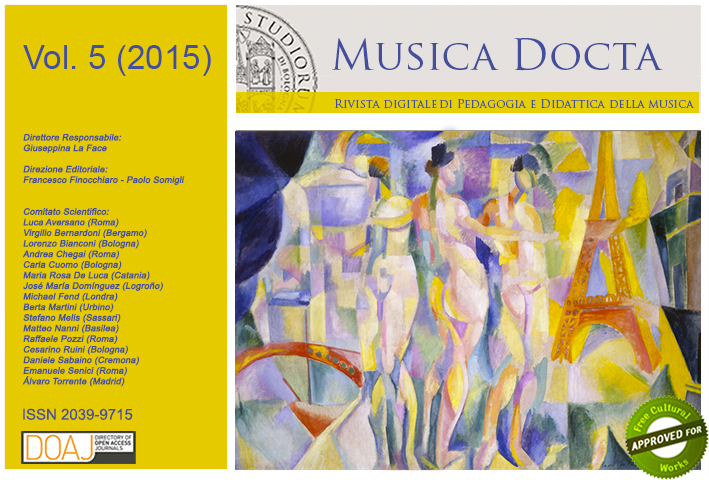Theoretical Conceptions in Musicology as a Potential Obstacle to Musical Comprehension
DOI:
https://doi.org/10.6092/issn.2039-9715/5869Parole chiave:
music theory, theoretical doctrines, reductionismAbstract
The core of the history of musical thought consists of large-scale doctrines striving to explain the multitude of observed phenomena in terms of immutable categories and universals. All such doctrines are based on the belief of their authors that all the complex and differentiated phenomena have their origins in simple principles. Accordingly, any music that cannot be convincingly reduced to these principles is either ignored or declared ‘abnormal’. Any doctrine inevitably stops before what in music is not quite ‘system-defined’. Though doctrines may point to ‘irregularities’, they can hardly justify them aesthetically. The by-effect of their influence is the growth of prejudices around anything that is new and unusual.
A huge array of musicological literature, developing the methodological principles of ‘big’ classical conceptions or propounding new conceptions that also claim to be scientific and universal, can hardly help the reader to clarify his perception of the unfamiliar or to discover new meanings in what is well known (the present paper illustrates this using several examples from different brands of musicology, both Russian and non-Russian). This arguably means that the ‘scientistic’ (reductionist) paradigm in musicology has been exhausted and the new, deeper knowledge of music has to be acquired through alternative, not strictly scientific – perhaps rather literary, openly subjective, authority-free – ways.
Downloads
Pubblicato
Come citare
Fascicolo
Sezione
Licenza
Copyright (c) 2015 Levon Hakobian
I diritti d'autore di tutti i testi nella rivista appartengono ai rispettivi autori senza restrizioni.
La rivista è rilasciata sotto una licenza Creative Commons Attribuzione Condividi allo stesso modo 4.0 Internazionale (codice legale completo).
Vedere inoltre la nostra Open Access Policy.
Metadati
Tutti i metadati dei materiali pubblicati sono rilasciati in pubblico dominio e possono essere utilizzati da ognuno per qualsiasi scopo. Questi includono i riferimenti bibliografici.
I metadati – riferimenti bibliografici inclusi – possono essere riutilizzati in qualsiasi formato senza ulteriori autorizzazioni, incluso per scopo di lucro. Chiediamo cortesemente agli utenti di includere un collegamento ai metadati originali.






